-
About
- About Listly
- Community & Support
- Howto
- Chrome Extension
- Bookmarklet
- WordPress Plugin
- Listly Premium
- Privacy
- Terms
- DMCA Copyright
- © 2010-2025 Boomy Labs

 GOAT Series Staff
GOAT Series Staff
Listly by GOAT Series Staff
What is the greatest cult classic of all time?
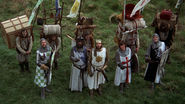
A cult classic film doesn’t always end up ignored and discarded by the general population. Monty Python and the Holy Grail, produced by the legendary Monty Python comedy group (best known for their televised sketches), is a project that transcended its status as a niche comedy film and found mainstream success with in American and European markets. Driven by memorable moments such as the Holy Hand Grenade and the limbless knight duel, the film’s claim to fame is its highly quotable nature and adherence to offbeat but witty humor. Watching the film will not further your understanding of feudal politics, but it might teach you a thing or two about the velocity of unladen swallows, and will certainly compel you to make clapping coconut noises during your packhorse imitations.
Release: 1975 | Director: Terry Gilliam, Terry Jones | Writer: Monty Python | Production Company: Python (Monty) Pictures | Lead Actors: Graham Chapman, John Cleese, Terry Gilliam, Eric Idle, Terry Jones, Michael Palin
Budget: $400,000 | Box Office: $5.00 mm | Rotten Tomatoes Score: 97% | IMDB Rating: 8.4
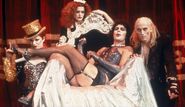
In some cases, cult classics are immortalized because of their inherent oddness. The Rocky Horror Picture Show is a production that revels in its own weirdness and glam aesthetics, decking out actors such as Tim Curry in fishnets, lipstick, and black leather. It serves as a faithful adaptation of its 1973 musical predecessor, and embraces its own sense of campiness so passionately that its status as a cult film was inevitable. The film is still frequently played at small theater gatherings, especially around Halloween, when legions of adoring (and in-costume) fans descend on cinemas nationwide to dance to the Time Warp and participate in their favorite audience call-back quotes. Although its initial run was a relatively quiet affair, the Rocky Horror Picture Show of today is more alive and enduring than ever.
Release: 1975 | Director: Jim Sharman | Writer: Jim Sharman, Richard O'Brien | Production Company: 20th Century Fox | Lead Actors: Tim Curry, Susan Sarandon, Barry Bostwick
Budget: $1.4 million | Box Office: $139.8 million | Rotten Tomatoes Score: 78% | IMDB Rating: 7.4
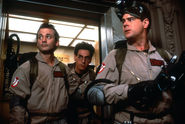
This was the film that turned crossing the streams into a capital offense, and made marshmallows seem like a viable host for poltergeists. Like several other films of its time, Ghostbusters garnered attention with a competent blending of genres – horror, comedy, and adventure, in this case – framed against a tightly-woven script. The film was well-received at its premier, and its fanfare has only increased with time. Featuring a likeable, star-studded cast, outlandish battles against the paranormal forces of this world and beyond, and memorable outfits that make at least one appearance at every film, sci-fi, or comic book convention, Ghostbusters is ingrained in media history and the minds of film fanatics everywhere. No matter how old the franchise gets, there will always be ectoplasm-loving fans ready to take on the unknown (and topple a few Stay Puft titans in the process).
Release: 1984 | Director: Ivan Reitman | Writer: Dan Aykroyd, Harold Ramis | Production Company: Black Rhino, Delphi Productions | Lead Actors: Bill Murray, Dan Aykroyd, Sigourney Weaver, Harold Ramis, Ernie Hudson, Rick Moranis
Budget: $30 million | Box Office: $295.2 million | Rotten Tomatoes Score: 97% | IMDB Rating: 7.8
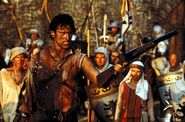
Because of Bruce Campbell, a double-barrel Remington shotgun is most associated with the shout, “This is my boomstick!” Army of Darkness plays with the tropes of reverse time travel and undead uprisings, and with the help of Bruce Campbell’s reprised Ash Williams role, manages to create an offbeat and memorable action flick. It was the third entry in the Evil Dead series, but arguably the most memorable, with iconic shots of Bruce Campbell manning medieval battlements and shooting off the skeleton hordes with both shotgun barrels blazing. The mixture of gallows humor, over-the-top action, and obvious campiness is what allowed Army of Darkness to succeed in its initial box office run (or, at the least, to make back its budget and then some). In recent years, however, the film has only accumulated more fans, attention, and DVD sales.
Release: 1992 | Director: Sam Raimi | Writer: Sam Raimi, Ivan Raimi | Production Company: Dino de Laurentiis Company, Renaissance Pictures, Universal Pictures | Lead Actors: Bruce Campbell, Embeth Davidtz, Marcus Gilbert
Budget: $13 million (estimated) | Box Office: $11.5 million | Rotten Tomatoes Score: 70% | IMDB Rating: 7.6
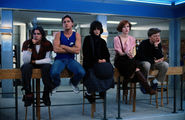
Something about the 1980s facilitated the production of iconic and polished teen films, and John Hughes truly basked in this mysterious aura. Hughes produced films such as Sixteen Candles, which also starred The Breakfast Club’s own Molly Ringwald, and proved himself as a master of the genre. The Breakfast Club is debatably the best teen film of the era, if only for its snappy character exchanges and flawless renditions of high school archetypes. Despite its limited set pieces (which are, for the most part, contained within a high school library), the film manages to touch on everything from domestic abuse to clique expectations, and casts no judgment on its eclectic detention cast. The Breakfast Club lives on as a classic for teenagers and adults alike, and can still be found in weekend movie marathons or internet quotes with ease.
Release: 1985 | Director: John Hughes | Writer: John Hughes | Production Company: A&M Films, Channel Productions | Lead Actors: Emilio Estevez, Paul Gleason, Anthony Michael Hall, John Kapelos, Judd Nelson, Molly Ringwald, Ally Sheedy
Budget: $1 million | Box Office: $51.5 million | Rotten Tomatoes Score: 91% | IMDB Rating: 7.9
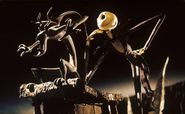
It’s safe to say that a film has achieved some success and attention if Marilyn Manson produces an adaptation of its main theme music. The Nightmare Before Christmas, which carries heavyweight brand involvement from both Disney and Tim Burton, rose to prominence as a well-crafted and whimsical exploration of the stop-motion craft. With Danny Elfman’s musical touch and Burton’s eye for uncanny, the film created its own mood, immersive universe, and subculture dedicated to patchwork skin-sewing and impossibly thin tuxedo cuts. Jack Skellington is as much an icon of animated cinema as Mickey Mouse, in the eyes of millions of Nightmare fans, and lives on in countless merchandise items and franchises (including Disney’s Kingdom Hearts series). It’s almost impossible to miss this classic – or its costumed fans – whenever Halloween rolls around.
Release: 1993 | Director: Henry Selick | Writer: Caroline Thompson, Michael McDowell | Production Company: Touchstone Pictures, Skellington Productions | Lead Actors: Danny Elfman, Chris Sarandon, Catherine O'Hara, William Hickey
Budget: $18 million | Box Office: $81.7 million | Rotten Tomatoes Score: 94% | IMDB Rating: 8.1
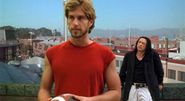
If some cult classics are so bad that they’re good, then The Room is potentially the best of the best. Written, produced, directed by (and starring) Tommy Wiseau, The Room is ostensibly a drama revolving around the tragic breakdown of a marriage. In presentation, however, The Room is one of the most poorly-acted and cringe-worthy films in years, and its painful lack of awareness regarding its own failure has made it an accidental masterpiece for its “fans.” With lines that alternate between chicken imitations, rooftop football-tossing, and marital abuse accusations, The Room’s catastrophic acting and writing are also its greatest strengths. Contemporary screenings of the film include audience members reciting the entirety of the film, or simply calling out the most memorable and painful lines in the script. The Room may not be objectively “good,” but it’s a champion among cult films.
Release: 2003 | Director: Tommy Wiseau | Writer: Tommy Wiseau | Production Company: Self-Produced | Lead Actors: Tommy Wiseau, Juliette Danielle, Greg Sestero, Philip Haldiman, Greg Sestero, Philip Haldiman
Budget: $6 million | Box Office: $1,800.50 | Rotten Tomatoes Score: 33% | IMDB Rating: 3.5
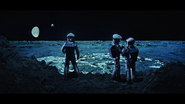
Long before Mission to Mars, Gravity, or even Star Wars, Stanley Kubrick was the pioneer of space films. His adaptation of Arthur C. Clarke’s 2001: A Space Odyssey was a bold and dramatic undertaking, and its depiction of the vast unknown was (and continues to be) one of the most stirring portrayals of interstellar travel in cinema. Aside from commercial and critical success, however, 2001 also created a dedicated collection of fans that worshiped HAL, the ship’s nearly omnipotent AI, and were willing to spend hours dissecting the story’s mind-boggling presentation of evolution, interspecies contact, and cosmic infants floating through tunnels of color and light. Nearly 50 years after 2001: A Space Odyssey was released, hardcore fans and first-time viewers continue to marvel at the film’s visuals and realism, and with good reason.
Release: 1968 | Director: Stanley Kubrick | Writer: Stanley Kubrick, Arthur C. Clarke | Production Company: Metro-Goldwyn-Mayer | Lead Actors: Keir Dullea, Gary Lockwood
Budget: $10.5 to $12 million | Box Office: $190 million | Rotten Tomatoes Score: 95% | IMDB Rating: 8.3
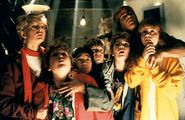
Goonies never die, and evidently, neither does the franchise’s legacy. Driven by a cast of young actors that would later become accomplished veterans in Hollywood, The Goonies is a film that capitalizes on its sense of adventure, teenage rebellion, and pushing back against monotony. Its sets were imaginative and expansive, even with their inherently subterranean design, and the search for lost pirate treasure was among the more appealing plotlines from 1980s adventure films. Although the film was not Oscar-material in a critical sense, it quickly gathered a strong fan community and ended up on everything from major television networks to internet memes. But the film had a lasting impact in multiple areas. Slang such as “the truffle shuffle,” thanks to Cory Feldman, is now part of the American English lexicon, for better or worse.
Release: 1985 | Director: Richard Donner | Writer: Chris Columbus | Production Company: Amblin Entertainment | Lead Actors: Sean Astin, Josh Brolin, Jeff Cohen, Corey Feldman, Kerri Green
Budget: $19 million | Box Office: $61.3 million | Rotten Tomatoes Score: 67% | IMDB Rating: 7.8
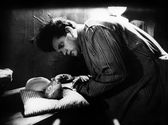
There’s no intrinsic expectation of surrealism in cult films, but Eraserhead epitomizes the concept and comes close to the level of brain implosion found in films such as Pi and Primer. Eraserhead has a deceptively simple concept, focusing on a man with eccentric hair in an apartment building. From there, however, the plot only becomes more disturbing, and more otherworldly. David Lynch shot the film in black-and-white, and it only makes the dark blood – which flows freely from a chicken served for dinner – that much more disturbing. The protagonist reveals hardly anything about himself, and after watching the film, you feel a sense of unease, if only from glimpsing the close-up shots of a lizard infant. Eraserhead is one of Lynch’s strangest films, but its admiration and following in cult circles only seems to thrive on that honor.
Release: 1977 | Director: David Lynch | Writer: David Lynch | Production Company: American Film Institute | Lead Actors: Jack Nance, Charlotte Stewart, Jeanne Bates
Budget: $20,000 (estimated) | Box Office: $7.0 million | Rotten Tomatoes Score: 91% | IMDB Rating: 7.4
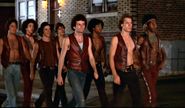
The Warriors is a classic example of a comic book visual approach being (correctly) applied in film. Centered around vest-wearing gang members known as The Warriors, the film takes the viewer throughout New York City in a single night of debauchery and violence. The various gangs in the film are styled differently and carry their own unique identities, from the baseball-bat-wielding Furies to the all-female Lizzies. Fans of the film are never shy to shout common phrases from their favorite characters, including the always popular, “Come out and play!” comment. The Warriors is not an attempt at individuality through bizarreness, but a focused and enjoyable romp through the streets and all their grit. If The Warriors video game – which just came out a few years ago – is any indication, this film has a long and fruitful life ahead of it as a cult gem.
Release: 1979 | Director: Walter Hill | Writer: David Shaber, Walter Hill | Production Company: Paramount Pictures | Lead Actors: Michael Beck, James Remar, Dorsey Wright, Brian Tyler, David Harris
Budget: $4.0 million | Box Office: $22.4 million | Rotten Tomatoes Score: 94% | IMDB Rating: 7.7
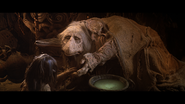
Jim Henson’s project, The Dark Crystal, is among the more controversial cult films (at least, in origin). The original cut of this darker-than-usual Henson film was cited as being too difficult to follow, and the production company insisted on adding voiceovers to help guide the viewer. Cuts of the original film are now available, and this is the copy that most purists tend to watch for recreational viewing. The Dark Crystal is significantly darker and more disturbing than some of its similarly-themed counterparts for young audiences, but it makes no apologies for its content, and takes full advantage of well-developed lore and world design. Jim Henson may not have gotten his way with the theatrical release of this masterpiece, but thanks to hordes of cult fans, The Dark Crystal is frequently seen and enjoyed as intended.
Release: 1982 | Director: Jim Henson, Frank Oz | Writer: David Odell | Production Company: ITC Entertainment Henson Associates | Lead Actors: Stephen Garlick, Lisa Maxwell, Billie Whitelaw
Budget: $15 million | Box Office: $40.5 million | Rotten Tomatoes Score: 71% | IMDB Rating: 7.2
